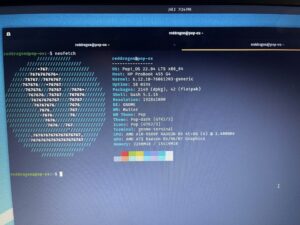

This is the second part of my travel setup series. While this is not the polished, finished project, it expands upon the last post I made about the travel router. This idea came up when I realized what the actual definition of a server is. A server is essentially a PC that is serving up content or services.
The question is, why can’t a laptop become a server?
I have a laptop that I installed Pop_OS! on a few years ago. The hardware is decent for a laptop that my dad bought me back in 2019 during my undergraduate studies. Part of the idea behind a lot of my projects is repurposing things so that they can have new life breathed into them. I also decided that I could modify it a little to make it behave like a Linux server.
The main difference between a server-based operating system and a client-based operating system is the packages that are pre-installed when you install and boot the OS. My Ubuntu Server OS, for example, is configured with things like OpenSSH, Docker, and Firewall Configurations. Making the adjustments wasn’t hard, but it did take some digging to get things working properly.
I had to install OpenSSH, Docker, and change the iptables setup as well. I realized Docker would not work unless I went to another version of iptables. Also, I had to make hardware adjustments in settings to make sure it didn’t go into hibernation status. Once I got past that, we were ready to go.
It has worked flawlessly so far. I currently have installed:
- Samba for file sharing (Internal hard drive is 1TB)
- Portainer and Docker (For loading containers and managing them)
- Minecraft (want to test and see if I can access that server from the laptop itself)
- Gemini CLI (I wanted to poke around with a self-hosted AI, and it was easiest to set up here)
I’m planning to install more stuff down the line and add other services I use daily. Considering this laptop has more RAM in it than my other servers I have in my home, I may go ahead and load some heavier cyber services on it and see what happens. I’m looking at testing another VPN idea as well as installing Tailscale on it, so it’ll be in my Tailscale network cluster of devices.
If you have an extra laptop lying around with decent hardware specs, I’d say slap a Linux distro on it and make your own travel server.